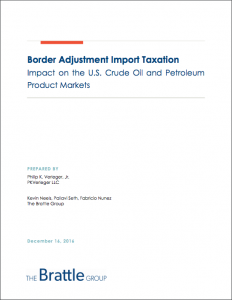Full Title: Border Adjustment Import Taxation Impact on the U.S. Crude Oil and Petroleum Product Markets
Author(s): Philip K. Verleger, Jr. & Kevin Neels, Pallavi Seth, Fabricio Nunez
Publisher(s): The Brattle Group
Publication Date: December 1, 2016
Full Text: Download Resource
Description (excerpt):
The Tax Reform Task Force, created by the Speaker of the House, Paul D. Ryan, and spearheaded by the Chairman of the House Ways and Means Committee, Kevin Brady, has put forward a wide-ranging legislative plan—Tax Reform Task Force Blueprint (“the Blueprint”)—that would result in a comprehensive revision of the U.S. tax code. Included as part of the Blueprint were significant changes to how corporate income is taxed. Under this Blueprint, corporations would be taxed not on income as currently defined in tax law but rather on the firm’s net revenue. Furthermore, the tax would be limited to the territory of the U.S., meaning that revenue earned through exports would not be taxed and that expenditures on imported goods could not be excluded from the firm’s revenues. Any tax paid on domestic costs incurred by an exporter on export sales would be rebated to the exporter.
This proposed tax arrangement is highly unusual. No other country border adjusts their income tax. Most nations do impose a border adjusted value-added tax (“VAT”) on goods sold, however.
The enactment of the border adjustment tax proposed by the Tax Reform Task Force will have profound impacts on the U.S. economy. For example, the cost of electronic goods produced in China, Japan, and other Asian countries will increase. Some portion of the increase will likely be reflected in the retail prices. The cost of imported automobiles will also be affected, likely leading to price increases for Audi, BMW, Honda, Hyundai, Land Rover, Mercedes, Toyota, and Volkswagen products, as well as for prices of other automobiles manufactured abroad.
